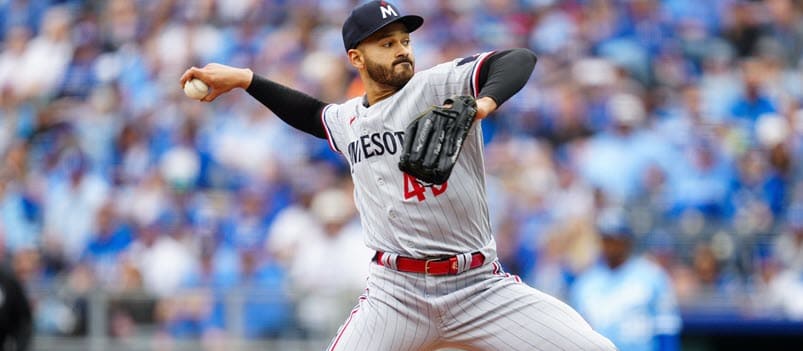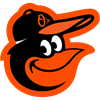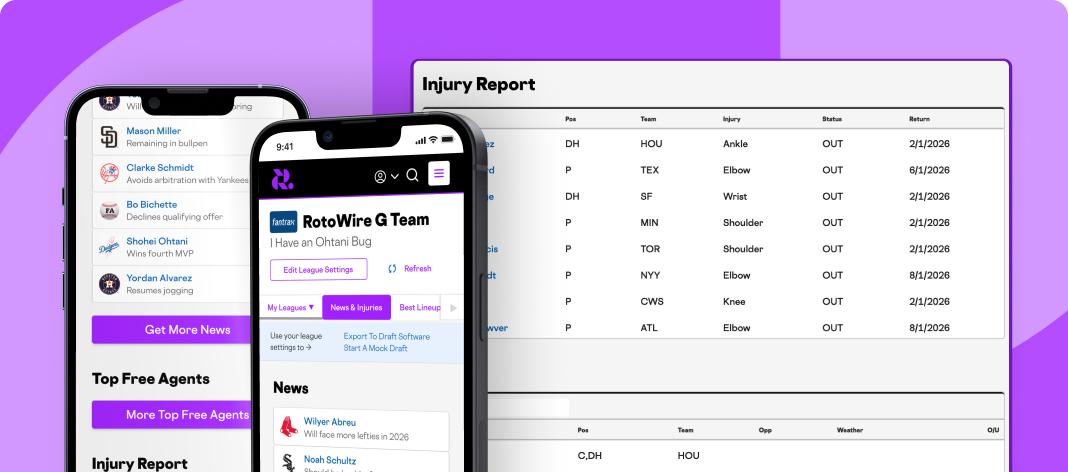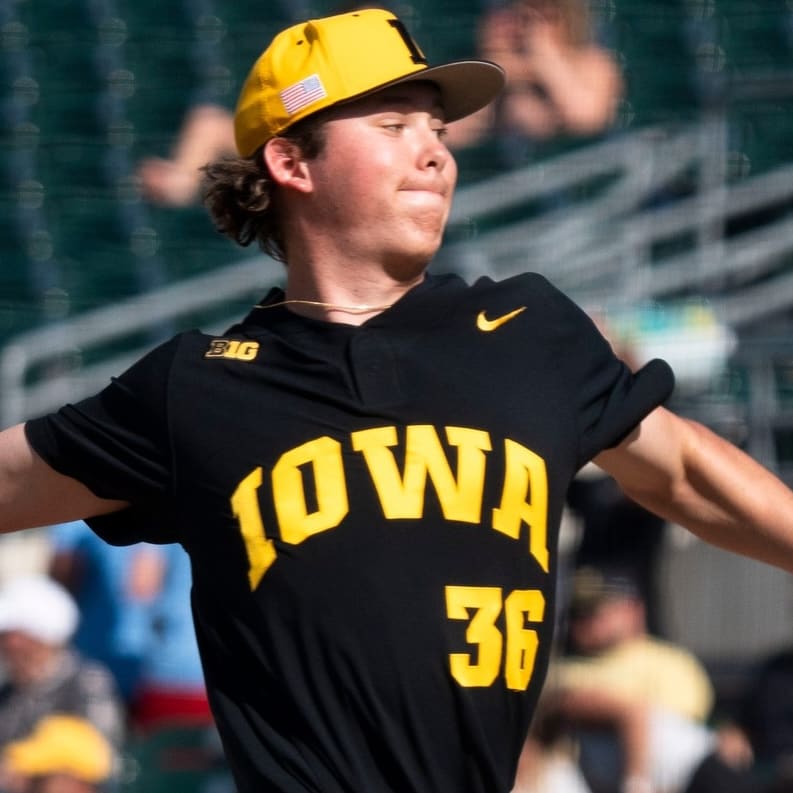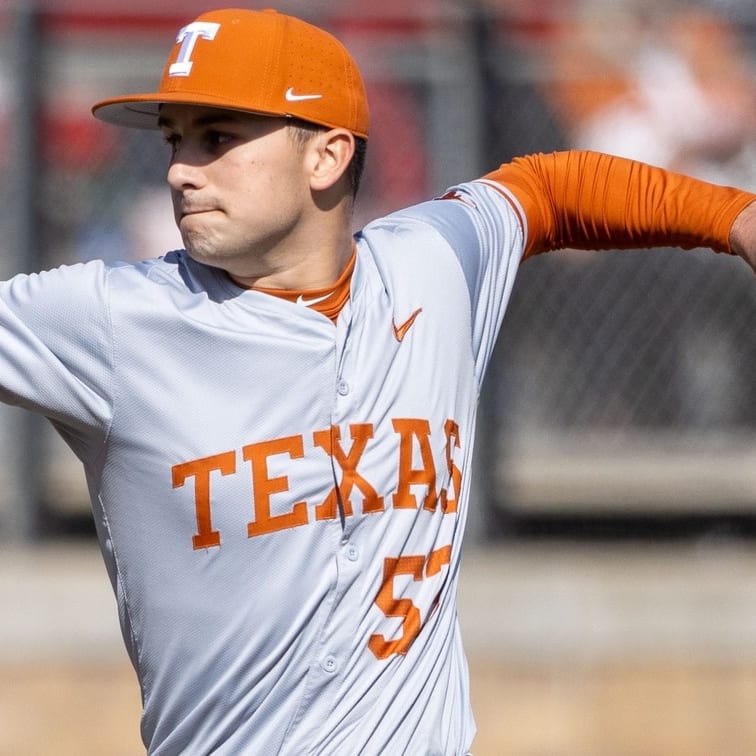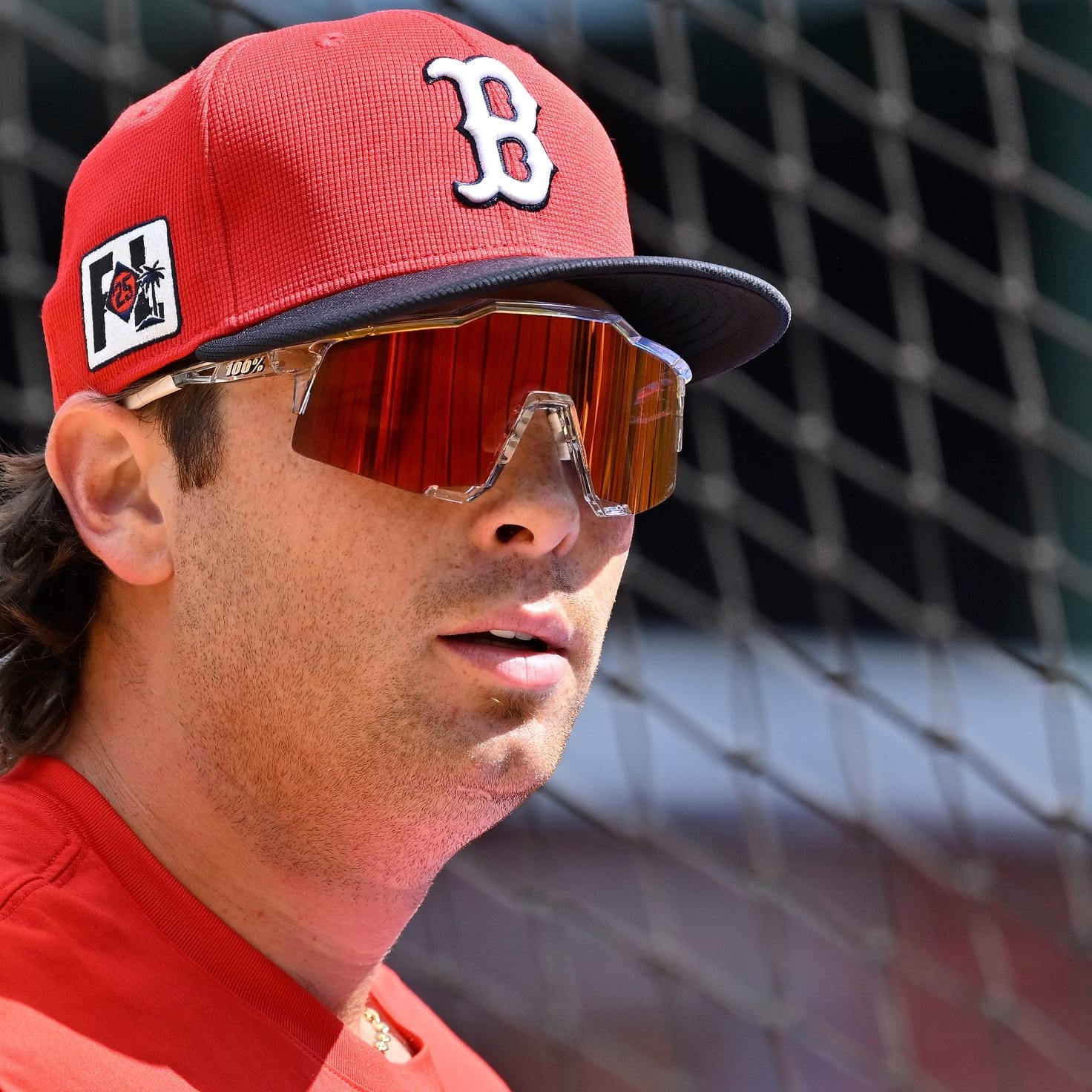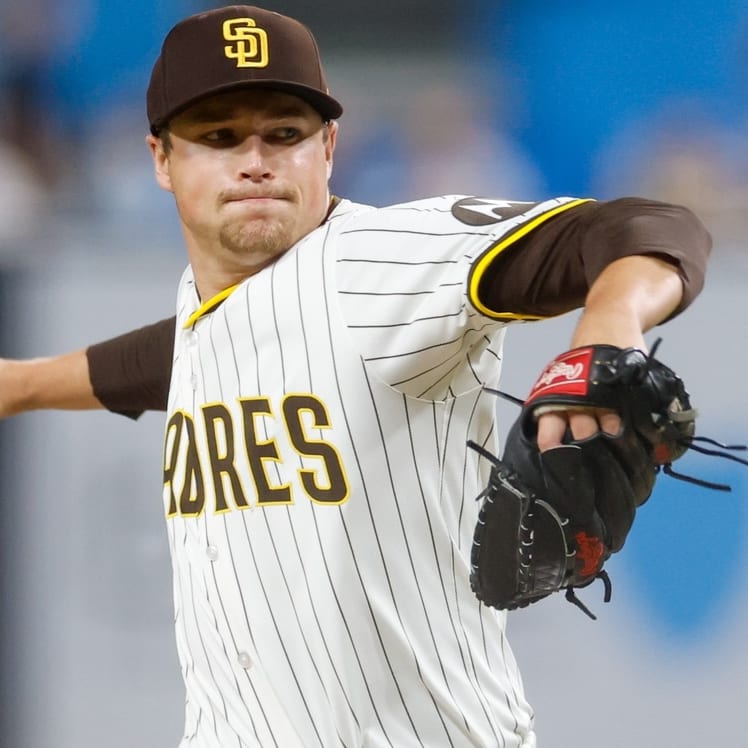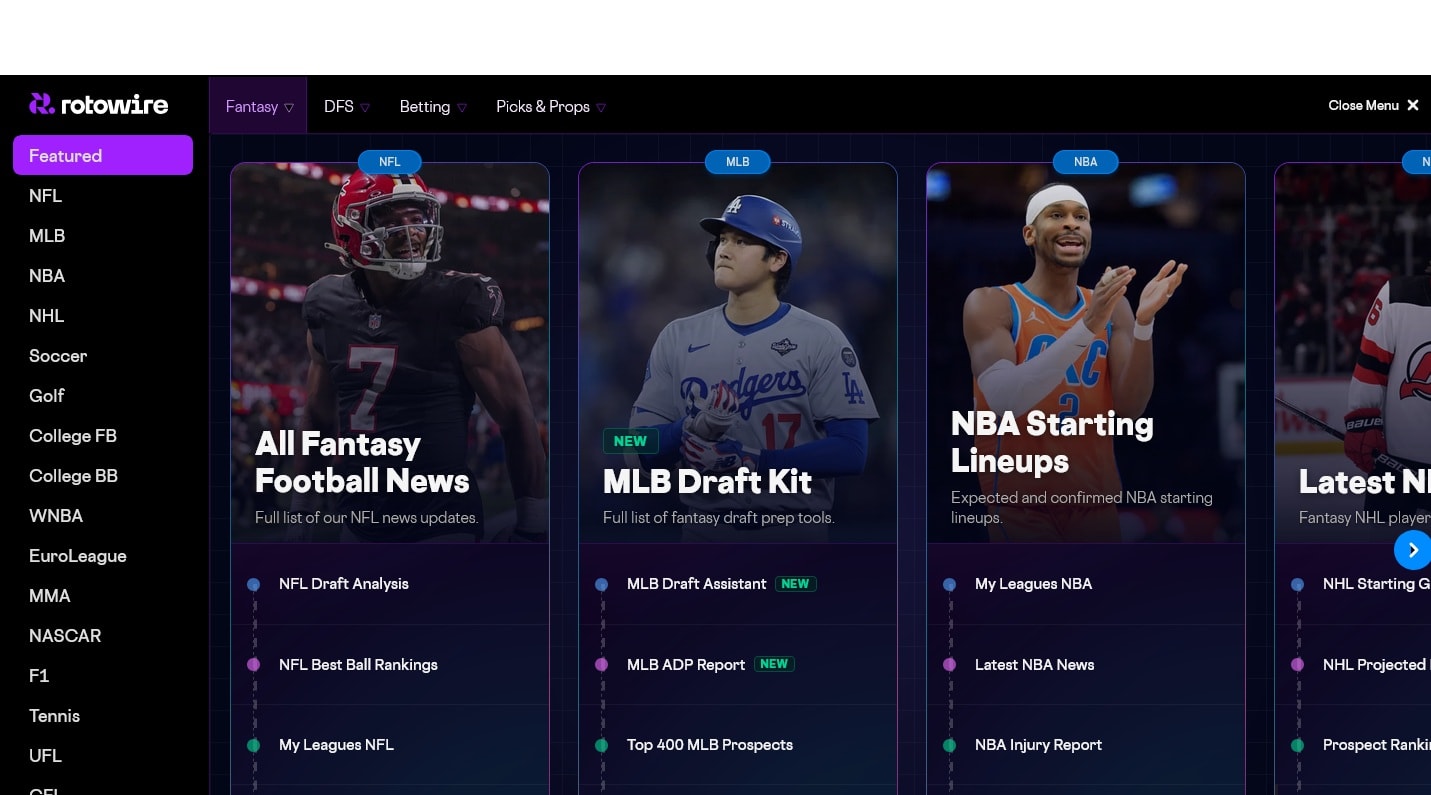We've had three FAAB periods so far out of a total of 27, and we're just over 10 percent of the way through the season. With so much data available these days, fantasy managers are becoming sharper and sharper, and there's little time to wait and see whether strong starts are for real. We'll look at four pitchers, including two starters and two relievers, who have shown potential skill changes early in the 2023 season. Let's look at whether these early pitcher skill changes appear sustainable or not.
Is Aroldis Chapman Bouncing Back?
It probably isn't sustainable, but Aroldis Chapman boasts a career-best 23.6 percent swinging-strike rate, though that comes with a career-low chase rate (20 percent). Chapman's fastball velocity (99.6 mph) is at its highest since 2017, when it topped 100 mph for the fourth consecutive year. With the added velocity on the four-seamer, Chapman's 25.6 percent swinging-strike rate on that pitch is nearly 11 points higher than his career norm. The visual below shows the four-seamer whiff rates by year.
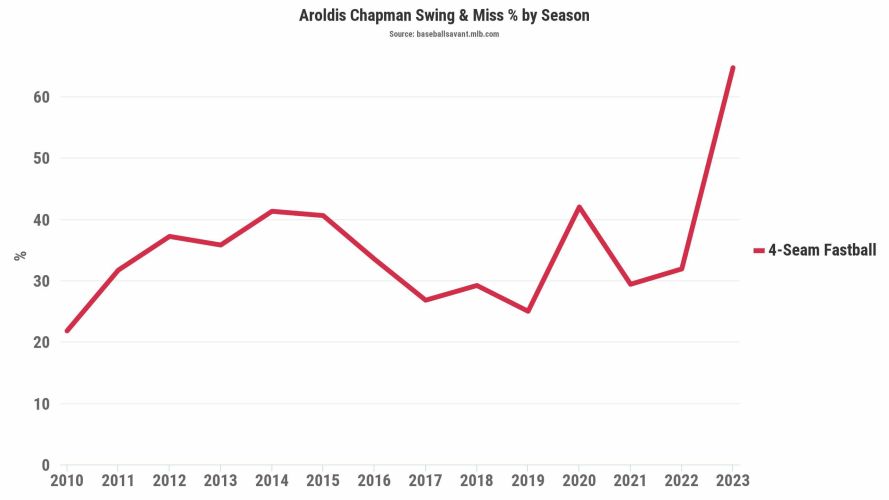
These career bests and surges will likely dip with more innings, but it's a positive sign in terms of potential skill changes and improvements for Chapman. Monitor his control, too, since Chapman has only rocked a single-digit walk rate in five out of his 13 career seasons prior to this one, most recently during the shortened 2020 season. Chapman is throwing his pitches in the zone 50.7 percent of the time, over six points higher than his career
We've had three FAAB periods so far out of a total of 27, and we're just over 10 percent of the way through the season. With so much data available these days, fantasy managers are becoming sharper and sharper, and there's little time to wait and see whether strong starts are for real. We'll look at four pitchers, including two starters and two relievers, who have shown potential skill changes early in the 2023 season. Let's look at whether these early pitcher skill changes appear sustainable or not.
Is Aroldis Chapman Bouncing Back?
It probably isn't sustainable, but Aroldis Chapman boasts a career-best 23.6 percent swinging-strike rate, though that comes with a career-low chase rate (20 percent). Chapman's fastball velocity (99.6 mph) is at its highest since 2017, when it topped 100 mph for the fourth consecutive year. With the added velocity on the four-seamer, Chapman's 25.6 percent swinging-strike rate on that pitch is nearly 11 points higher than his career norm. The visual below shows the four-seamer whiff rates by year.

These career bests and surges will likely dip with more innings, but it's a positive sign in terms of potential skill changes and improvements for Chapman. Monitor his control, too, since Chapman has only rocked a single-digit walk rate in five out of his 13 career seasons prior to this one, most recently during the shortened 2020 season. Chapman is throwing his pitches in the zone 50.7 percent of the time, over six points higher than his career average. If he somehow harnesses his control and pitches in the zone while holding onto his increased fastball velocity, that's a scary combination.
Kris Bubic Flashing Strikeout Stuff
The up-and-coming Royals hitters, including Bobby Witt, Vinnie Pasquantino and MJ Melendez, have produced at the big-league level. However, their young starting pitchers haven't fared so well, including all four of the team's quartet of 2018 first-round picks (Brady Singer, Kris Bubic, Daniel Lynch and Jackson Kowar). Before the 2023 season, Bubic had a 22.1 percent strikeout rate, 9.9 percent walk rate and 10.3 percent swinging-strike rate for his career. Through two starts (11 innings), Bubic boasts a 30.2 percent strikeout rate, a 2.3 percent walk rate and an 18.8 percent swinging-strike rate.
It's a small sample, so we don't want to overreact, but Bubic became a serious FAAB target last week for a reason. Bubic has some luck factors in his favor including a 81.8 percent strand rate, but we can't overlook his strikeout skills. His fastball velocity has jumped by over one mph thus far, and his changeup and slider have been getting whiffs. Through two starts, Bubic's changeup elicits a 27.3 percent swinging-strike rate, with the slider at 24.1 percent. Interestingly, the chase rate on the slider is low so far, so we might see its swinging-strike rate decline. The slider is a new pitch for Bubic so we have no previous numbers to compare it with, but the changeup has improved in swinging-strike rate by over 12 percent.
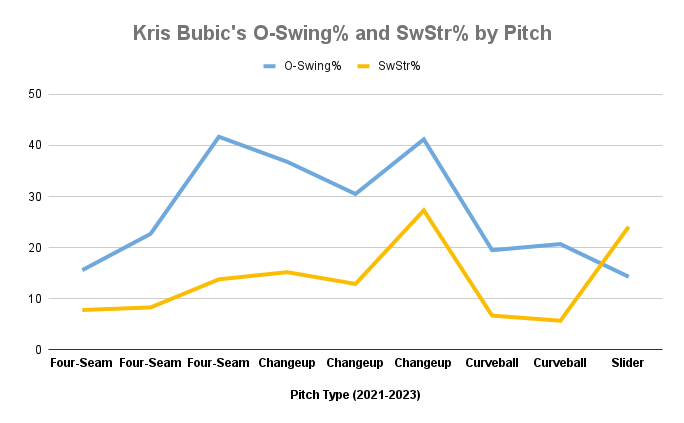
With how much information is at our fingertips, there's no time to wait and see with Bubic. Prioritize him on waivers if he's still there since his strikeout skills might stick around, especially with the the arrival of new pitching coaching Brian Sweeney adding a narrative element to go with the data. The addition of the slider could be big, as it possesses an above-average movement profile according to its vertical and horizontal break. Since Bubic previously looked like a control/command-type pitcher, the enticing skills and new stuff seem noteworthy.
Pablo Lopez's Potential
Lopez is flashing early strikeout skills with a 36.6 percent strikeout rate while continuing to limit the walks (7.0 percent). Lopez is eliciting opposing hitters to chase at a 45.5 percent clip and whiff on 17 percent of their swings. The added whiffs are coming from a newly-introduced sweeper as well as from the changeup, which has gotten more swings outside the zone than it did last year.
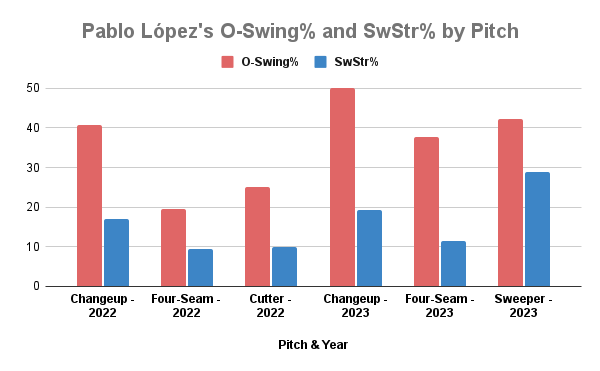
The visual above shows the growth in Lopez's primary pitches. In addition to those improvements, Lopez has also added velocity to his four-seamer, which has jumped from 93.6 mph last year to 95.3 mph this season. He's using his sweeper against right-handed hitters, and it pairs nicely with his changeup, his main weapon against lefties. Regression will come as his luck subsides — he owns a .184 BABIP and a 87.3 percent strand rate — but Lopez's new and effective sweeper paired with a leap in strikeout skills gives reason for optimism moving forward.
Jose Alvarado Controlling the Zone
Last season, Alvarado lowered his walk rate (11.2 percent) but kept his strikeout rate high at a career-best 37.9 percent. Alvarado increased his strike percentage and lowered his ball percentage — a logical move, though easier said than done. From 2018 to 2021, Alvarado's ball percentage hovered just under 40 percent (39.9), but it dropped to 37.9 percent in 2022.
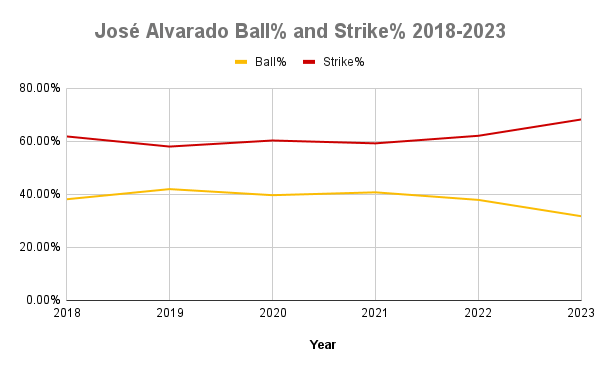
As seen in the graph above, Alvarado's strike rate increased to 62 percent in 2022, a two-point jump from 2018 to 2021. It's early, but the same trend is continuing in 2023, as Alvarado is throwing even more strikes. Thankfully, Alvarado's strike-throwing is also leading to swinging strikes, which hit a career-best 16.7 percent rate in 2022.
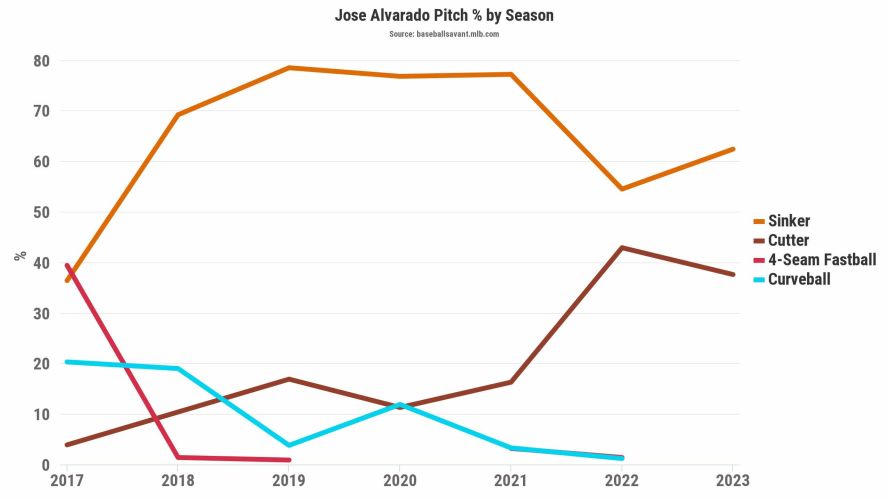
One possible reason for Alvarado's improved control is the lowered usage of his sinker and increased use of his cutter. That's a positive trend, especially considering the cutter is generating a filthy 26.9 percent swinging-strike rate, similar to last season's 28.5 percent mark. Currently, Alvarado's sinker boasts an 18.9 percent swinging-strike rate, but it's probably safe to guess that won't continue.
The Phillies bullpen is struggling, posting the third-worst team ERA (6.65) and the second-worst FIP (6.18). Some of that is luck, and some of it is the early offensive environment. Jason Collette wrote a piece this week covering the increase in offense, home runs and more, which made me wonder if we should emphasize streaming relievers more than starting pitchers given the current landscape. Hence where Alvarado comes in, as a reliever with improved control and strikeout skills that he's carrying over from 2022.
